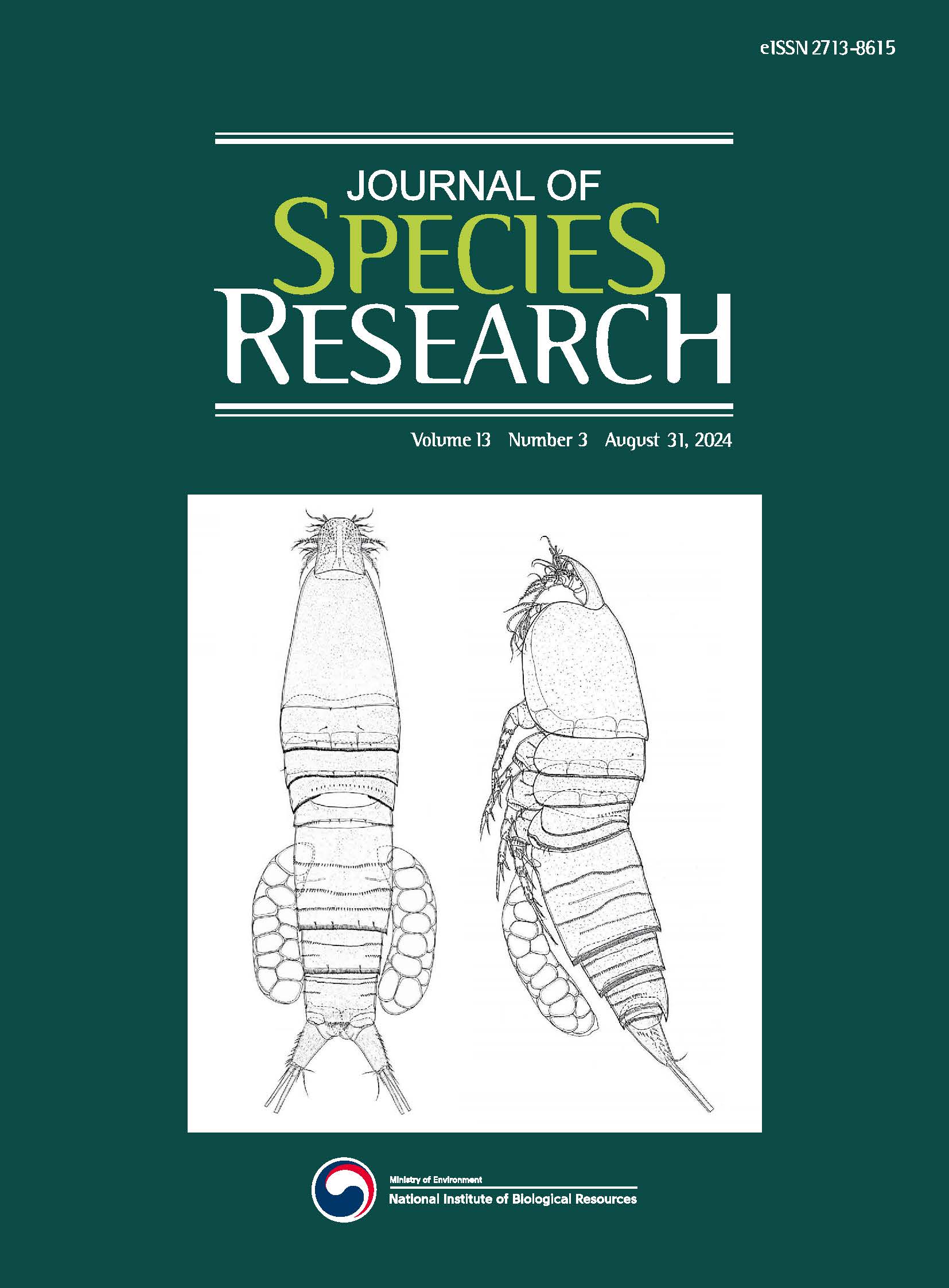- KOREAN
- E-ISSN2713-8615
- KCI
 E-ISSN : 2713-8615
E-ISSN : 2713-8615
Report of 22 unrecorded bacterial species in Korea belonging to phylum Bacteroidetes, discovered during surveys in 2018
Yeong seok Kim
Cha Chang Jun
Im Wan-Taek
Che Ok Jeon
Joh Ki Seong
Chi-Nam Seong
Yi, Hana
Seung Bum Kim
Abstract
The phylum Bacteroidetes covers phenotypically diverse groups of Gram negative rods that do not form endospores, and currently includes 6 classes, 6 orders, 33 families and 380 genera. Members of Bacteroidetes can be aerobic and anaerobic heterotrophs, hydrogen utilizing chemolithotrophs, or methylotrophs. They can be isolated from diverse habitats including terrestrial and aquatic environments, environments with extreme physicochemical conditions, and animal and plant hosts. During a series of extensive surveys of prokaryotic species diversity in Korea, bacterial strains belonging to Bacteroidetes were isolated from various sources of aquatic and terrestrial environments. A total of 22 isolates were obtained, which represent 22 unrecorded species in Korea belonging to 14 genera of 6 families. Sixteen species among them were assigned to Flavobacteriaceae, two species were to Sphingobacteriaceae, and single species was to each of the families Bacteroidaceae, Balneolaceae, Chitinophagaceae and Cytophagaceae. At genus level, Chryseobacterium (5 species) and Flavobacterium (5 species) were the most abundant genera, and single species were obtained for the genera Bacteroides, Baloneola, Terrimonas, Dyadobacter, Aquimarina, Arenibacter, Gillisia, Gilvibacter, Salinimicrobium, Winogradskyella, Pedobacter and Sphingobacterium. The detailed descriptions of each unrecorded species are provided.
- keywords
- Bacteroidetes, Chryseobacterium, Flavobacteriaceae, Flavobacterium, unrecorded species
Reference
Cho, J.C., C.N. Seong, K.S. Joh, C.J. Cha, J.W. Bae, H. Yi, S.D. Lee, M.K. Kim and J.H. Yoon. 2018. A report of 17 unrecorded bacterial species of Korea belonging to the phylum Bacteroidetes. J. Species Res. 7(3):231-239.
Euzéby, J.P. 2019. List of Prokaryotic Names with Standing in Nomenclature, as of August 2019 (www.bacterio.net).
Felsenstein, J. 1985. Confidence limits on phylogenies: an approach using the bootstrap. Evolution 39:783-791.
Jeon, Y.S., K. Lee, S.C. Park, B.S. Kim, Y.J. Cho, S.M. Ha and J. Chun. 2014. EzEditor: a versatile sequence alignment editor for both rRNA-and protein-coding genes. Int. J. Syst. Evol. Microbiol. 64:689-691.
Jukes, T. and C. Cantor. 1969. Evolution of protein molecules. In: H.N. Munro (ed.), Mammalian Protein Metabolism, Academic Press, New York. pp. 21-132.
Kim, O.S., Y.J. Cho, K. Lee, S.H. Yoon, M. Kim, H. Na, S.C. Park, Y.S. Jeon, J.H. Lee, H. Yi, S. Won and J. Chun. 2012. Introducing EzTaxon-e: a prokaryotic 16S rRNA gene sequence database with phylotypes that represent uncultured species. Int. J. Syst. Evol. Microbiol. 62(3):716-721.
Krieg, N.R., J.T. Staley, D.R. Brown, B.P. Hedlund, B.J. Paster, N.L. Ward, W. Ludwig and W.B. Whitman. 2012. Bergey’s Manual of Systematic Bacteriology, second edition, vol. 4, The Bacteroidetes, Spirochaetes, Tenericutes (Mollicutes), Acidobacteria, Fibrobacteres, Fusobacteria, Dictyoglomi, Gemmatimonadetes, Lentisphaerae, Verrucomicrobia, Chlamydiae, and Planctomycetes. Springer, New York.
Kumar, S., G. Stecher and K. Tamura. 2016. MEGA7: Molecular Evolutionary Genetics Analysis version 7.0 for bigger datasets. Mol. Biol. Evol. 33:1870-1874.
Lee, D.H., H.J. Jang, J.W. Bae, J.C. Cho, K.W. Jang, K.S. Joh, C.N. Seong and C.J. Cha. 2018. A report of 22 unrecorded bacterial species in Korea in the phyla Bacteroidetes and Rhodothermaeota. J. Species Res. 7(2):123-134.
Maeng, S., C. Baek, J.W. Bae, C.J. Cha, K.W. Jahng, K.S. Joh, W. Kim, C.N. Seong, S.D. Lee, J.C. Cho and H. Yi. 2018. A report of 28 unrecorded bacterial species, phylum Bacteroidetes, in Korea. J. Species Res. 7(2):104-113.
Saitou, N. and M. Nei. 1987. The neighbor-joining method: a new method for reconstructing phylogenetic trees. Mol. Biol. Evol. 4:406-425.
- Downloaded
- Viewed
- 0KCI Citations
- 0WOS Citations

